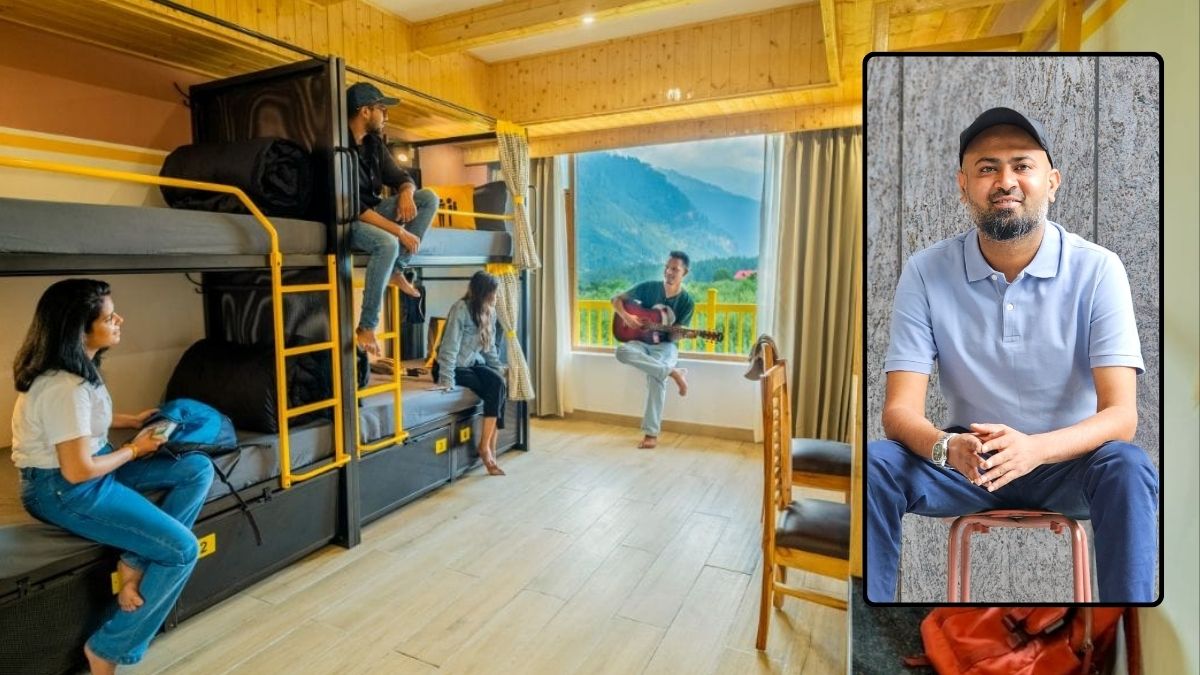The Hosteller CEO Pranav Dangi bats for experiential travel as more Indians pick up backpacking
 The Hosteller CEO and Founder Pranav Dang (inset); Travellers at a The Hosteller property | The Hosteller
The Hosteller CEO and Founder Pranav Dang (inset); Travellers at a The Hosteller property | The Hosteller
Experiential travel is no longer a fringe concept. It is rapidly becoming the mainstream choice for Indian travellers, particularly among the younger demographic. A recent report by Thomas Cook India highlights a significant shift: rising disposable incomes and the growing aspirational value of travel are encouraging Indians to seek deeper, more immersive experiences over conventional tourism.
Interestingly, The Hosteller, the backpacker hostel chain in India, is trying to capitalise on the principles of community, connection, and exploration; unlike traditional accommodations, it is offering travellers an experience that goes beyond a place to sleep and aims to create a space for interaction, discovery, and cultural immersion. “We have believed that travel is about more than just seeing new places; it’s about deeply experiencing them. We’re not just providing beds but crafting adventure and memories that stay with you,” Pranav Dangi, CEO and Founder of The Hosteller, told THE WEEK.
The company is aiming to meticulously curate unique properties, from hidden gems like Kareri and Khajjiar to serene escapes in Lansdowne and Kodaikanal. “We foster a vibrant community where travellers can truly connect with local cultures via our curated events, indulge in activities, and unwind at our vibrant in-house cafes that enhance their stay, creating stories that last a lifetime. This focus on experiential travel is not just a trend for us; it’s the very heartbeat of how we’re making India’s incredible diversity accessible and unforgettable for the modern backpacker,” added Dangi.
With experiential travel gaining momentum, the future of hospitality lies in authenticity, locality, and engagement. The Hosteller, rather than opting for cookie-cutter accommodations, the brand designs its properties to mirror local architecture, culture, and spirit. This approach not only enriches the guest experience but also contributes to sustainable tourism by supporting local communities and artisans. The company is expanding its footprint across India, carefully selecting destinations that resonate with the modern traveller’s quest for meaning and mindfulness.
The Indian backpackers now want to chase community, purpose, and Instagram-worthy moments. Dangi says that backpacking in India is no longer just about budget travel; it’s about freedom, flexibility, and forging real connections. For a growing tribe of young Indian explorers, especially Gen-Z, backpacking represents a way of life that values experiences over itineraries and stories over souvenirs.
Offbeat locations are getting very popular in India. While classic hill stations like Shimla, Manali, and Darjeeling remain popular, a new trend is taking root. Second-tier hill stations such as Jibhi, Shangarh, Bir, and Tirthan Valley are gaining popularity, particularly among Gen-Z travellers and content creators. These destinations offer the perfect blend of scenic beauty, tranquillity, and affordability, making them ideal for those seeking offbeat, less commercialised experiences.
“One of the most prominent changes we have seen is the way people have started travelling compared to previous patterns; guests are now open to not just locations in the South but also offbeat and less famous locations for a summer break. As occupancies generally soared high in our south hostels, we have started seeing an uptick in our north locations this summer,” said Dangi.
The company has seen that guests are increasingly choosing to book on weekdays and not just weekends. Dangi says that it points toward mindful travelling instead of rushing to the same famous locations and the same weekends when everyone would be too.
Dangi further observes that for the new generation of travellers, especially Gen-Z, travel isn’t just about sightseeing or checking off popular landmarks; it’s about feeling something. It’s about the stories that unfold around shared meals, the conversations with strangers who become friends, and the moments that aren’t on the itinerary but end up being the highlight. This shift towards experience-led travel is redefining how people move through the world. Gen-Z seeks authenticity, local culture, and a sense of belonging, whether it’s through volunteering, cultural workshops, or simply staying in spaces that foster real human connection.
“It’s less about luxury and more about layered, lived-in experiences. Travel has become a tool for community building, self-discovery, and personal storytelling—and that, more than the destination itself, is what truly matters. This rise of backpacking travel has also sparked a deeper sense of community on the road. From group treks to pop-up events and co-living spaces, young travellers are seeking out environments that foster genuine human connection,” remarked Dangi.
Tourism